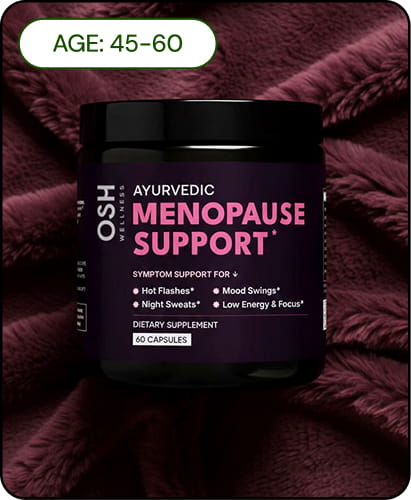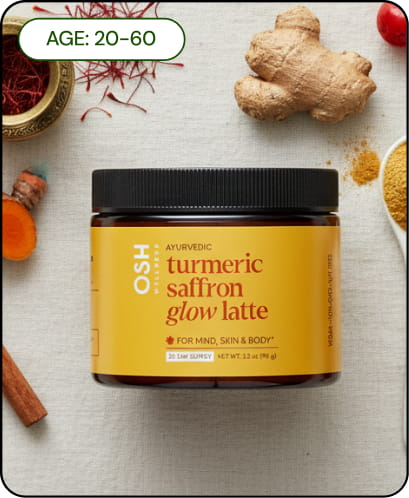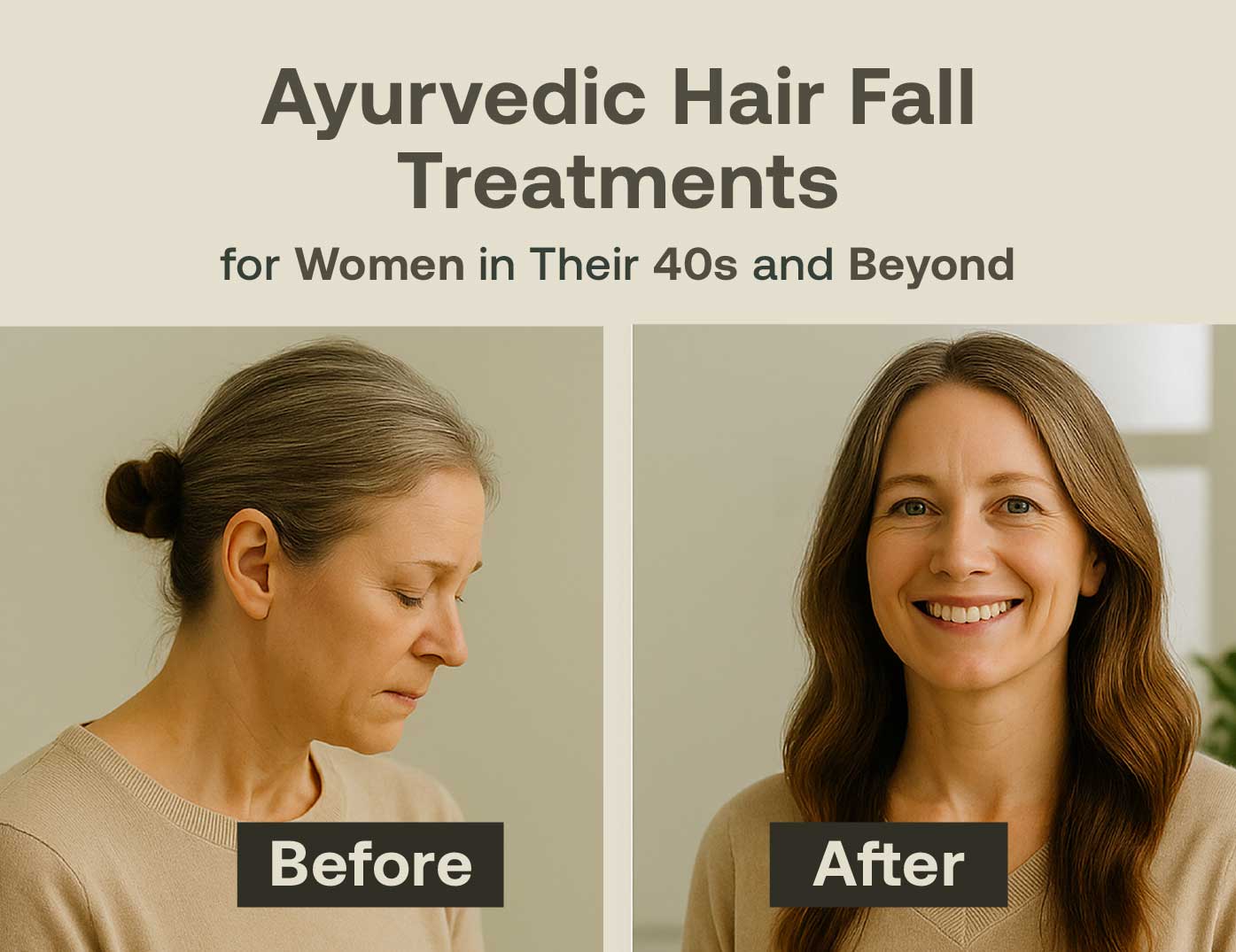Table of contents
Hair fall becomes a growing concern for many women as they step into their 40s, a life stage often marked by complex hormonal shifts, increased stress, and changing lifestyle demands. For women navigating perimenopause and menopause, the appearance and texture of their hair can alter noticeably, sparking the search for holistic, sustainable solutions. With its time-tested principles and emphasis on mind-body balance, Ayurveda has emerged as a natural ally for midlife hair care. This guide explores Ayurvedic hair fall treatments for women aged 35–60, highlighting herbs, daily practices, and routines that nourish hair from the inside out.
Understanding Hair Fall in Your 40s

Hair thinning in your 40s can stem from multiple overlapping causes. A major contributor is the hormonal decline that occurs during perimenopause and menopause. Estrogen and progesterone, two key hormones responsible for maintaining the growth phase of the hair cycle, begin to drop, leading to weakened hair follicles, slower hair regeneration, and increased shedding. The result is often finer, more brittle strands and visible thinning, especially near the crown or temples.
Another key factor is oxidative stress. This refers to the damage caused by free radicals, unstable molecules produced by poor diet, chronic inflammation, exposure to environmental toxins, and emotional stress. Oxidative stress accelerates the aging of hair follicles, reducing their ability to produce strong, resilient hair.
External habits and modern lifestyle choices compound the issue. Frequent use of heat styling tools, chemical treatments like dyeing or perming, lack of quality sleep, and high cortisol levels from daily stress can exacerbate hair fall.
Research indicates that around 30 million women in the U.S. experience androgenetic alopecia, a genetic form of hair thinning. By age 50, nearly half of all women notice significant hair changes. Fortunately, Ayurveda offers a comprehensive, drug-free path to address these shifts naturally by supporting hormonal harmony and nourishing the scalp and hair follicles from within.
The Power of Ayurveda for Hair Health

Ayurveda, the 5000-year-old holistic healing system, associates hair health with the balance of the three doshas: Vata, Pitta, and Kapha. In this view, hair problems are often a sign of internal imbalance.
Excess Pitta, the fire-energy dosha, is commonly linked to premature greying, thinning, and scalp inflammation. When Pitta accumulates, often due to spicy diets, stress, and heat exposure, it can damage the hair roots and accelerate hair aging.
Ayurvedic hair care emphasizes the use of nourishing herbs and oils to calm Pitta, rejuvenate follicles, and cool the scalp. Key therapies include:
Bhringraj – Known as the “king of herbs” for hair, it promotes hair growth, strengthens roots, and prevents early greying.
Amla – A rich source of vitamin C and antioxidants, it supports scalp circulation and enhances hair shine and strength.
Brahmi – A calming herb that soothes the nervous system and supports thicker, fuller hair.
These herbs are typically delivered through base oils such as sesame or coconut oil, which help them penetrate the scalp deeply. Beyond topical care, Ayurveda encourages a sattvic (balanced and pure) diet, regular yoga or meditation to manage stress, and daily rituals like scalp massage to stimulate circulation and nourish the mind.
Key Ayurvedic Herbs That Promote Hair Growth

Incorporating specific herbs into your routine can help reduce shedding and encourage regrowth. Below are Ayurvedic and complementary herbs with well-known hair-supportive benefits:
Bhringraj – Stimulates hair follicles and boosts blood circulation in the scalp. Ideal when applied as a warm oil.
Amla – Strengthens hair at the root and provides antioxidant protection. It’s often used as a powder or oil infusion.
Brahmi – Enhances mental clarity and blood flow to the scalp, supporting follicle nourishment.
Fenugreek – Rich in protein and nicotinic acid, fenugreek seeds help strengthen hair shafts. Soaked seeds can be ground into a paste for hair masks.
Hibiscus – High in amino acids, this flower improves shine, texture, and helps treat split ends.
Aloe Vera – While not traditionally Ayurvedic, aloe vera complements Ayurvedic care by hydrating the scalp, reducing itchiness, and soothing inflammation.
Regular use of these herbs through oils, masks, and dietary inclusion can help improve overall hair density, resilience, and appearance over time.
Ayurvedic Hair Fall Treatment & Rejuvenation

One of the cornerstone treatments in Ayurvedic hair care is Shiro Abhyanga , a traditional warm oil head massage. This practice stimulates circulation, relieves tension, and supports deep absorption of herbal oils.
How to Perform Shiro Abhyanga:
- Gently warm a herbal oil blend (e.g., Bhringraj or Brahmi oil).
Apply to the scalp using slow, circular motions, focusing on pressure points around the crown and temples.
Allow the oil to sit for 20–30 minutes (or overnight if possible).
Wash out using a mild, sulfate-free herbal shampoo.
Repeat this ritual 2–3 times a week for best results. For additional nourishment, apply hair masks made from ingredients like soaked fenugreek seeds, Amla powder, or crushed hibiscus petals. These can reduce inflammation, moisturize the scalp, and restore shine.
Lifestyle and Dietary Support for Healthy Hair

Topical applications are most effective when supported by internal health. Ayurveda views hair as a byproduct (or upadhatu ) of bone tissue, so overall nutrition, sleep, and emotional wellbeing must be prioritized.
Avoid:
Smoking and alcohol, which dehydrate the scalp and damage hair at the root.
Excess intake of processed sugar and caffeine.
Poor sleep patterns, which raise cortisol and weaken follicle resilience.
Incorporate:
Micronutrients: Vitamins A, B-complex, C, D, E, and K play critical roles in hair growth. Iron, zinc, selenium, and biotin are also essential.
Protein & Omega-3s: Eat legumes, seeds, nuts, and fatty fish to support keratin production and follicle health.
Hydration: Drink plenty of water and include hydrating fruits and vegetables to keep the scalp moisturized.
Mind-Body Practices: Yoga, deep breathing, and regular massage help regulate cortisol and improve circulation to the scalp.
Avoiding harsh styling techniques and chemical treatments can also help improve how your scalp responds to Ayurvedic care.
Case Studies and Expert Insights

Emerging evidence and anecdotal cases validate the power of Ayurvedic interventions:
A woman with androgenetic alopecia experienced significant hair regrowth with a customized herbal regimen focused on Bhringraj and Ashwagandha.
A combination of Dhatturadi Taila and Yashtimadhu churna (licorice root powder) helped reverse hair fall in a chronic case of scalp inflammation.
In cases of alopecia areata, Jalauka Karma (leech therapy) has been used to restore blood flow and encourage regrowth.
One clinical trial recorded an 80% increase in hair growth and a 63% reduction in hair fall after eight weeks of consistent Ayurvedic oil use.
What works best is a customized approach aligned to your prakriti (body constitution) and current doshic imbalance.
Relevant Products
Osh Wellness’ Cycle Care formula is an excellent complement to Ayurvedic hair regimens. While not a direct hair product, it supports hormonal equilibrium, mood stability, and menstrual regularity, all of which play a subtle but critical role in long-term hair vitality. For women in their 40s and beyond, this can form the hormonal foundation upon which strong, healthy hair can grow.
Conclusions

Hair thinning in midlife can feel disheartening, but it doesn’t need to be met with aggressive chemical treatments or invasive procedures. Ayurveda offers a thoughtful, layered approach rooted in self-care, herbal support, and inner balance. By working with your body's natural rhythms and embracing regular rituals, you can reclaim hair health and confidence.
Consistency and personalization are key. With the right combination of oils, herbs, diet, and lifestyle, your hair can grow stronger even as you move through life’s natural transitions.
FAQs
What are the best Ayurvedic herbs for hair fall?
Bhringraj, Amla, Brahmi, Fenugreek, and Hibiscus.
How can stress impact hair health?
Stress disrupts hormonal balance and increases inflammation, leading to excess shedding and follicle sensitivity.
How often should I use Ayurvedic oil?
Ideally 2–3 times per week. Leave it on for at least 20–30 minutes, or overnight if possible.
Can diet affect hair fall?
Absolutely. Nutrient deficiencies, particularly in iron, protein, zinc, and B vitamins can weaken hair follicles and cause excessive shedding.
Are there side effects to Ayurvedic remedies?
When used correctly, side effects are minimal. Always check for allergies and consult a qualified Ayurvedic practitioner before starting a new routine.







